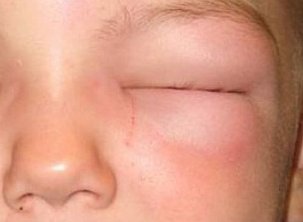Puffy itchy eyelids can cause a great deal of discomfort. The eyes are extremely sensitive, and itchy swollen eyelids can result from various factors, such as eye stye, eczema, eye allergic reactions and sunburns, for which treatments may vary.
Puffy itchy eyelids can be very bothersome. The eyes are really sensitive, and swelling in any part in or around it can cause a lot of discomfort. Itchy and swollen eyelids can arise from different aspects and treatments may differ. Here are some reasons why individuals have puffy itchy eyelids and their treatment options.
Conditions that cause puffy itchy eyelids
There are different conditions that can result in swollen and itchy eyelids. These include the following:
1. Blepharitis (Eyelid Inflammation)
Blepharitis or inflammation of the eyelids is a typical condition that can cause redness and swelling of the eyelids. About one in twenty eye problems seen by family doctors include puffy itchy eyelids due to blepharitis. It prevails in adults aged 50 and above, although it is seen at any age.
Accompanying symptoms include burning, stinging or pain in the eyes and crusting in the eyelashes. The infection might be caused by bacteria, or it may be secondary to seborrheic dermatitis (an itchy skin rash) or rosacea (a condition characterized by a red, blotchy face). Blepharitis is not contagious but it is a chronic or frequent condition.
There is no permanent remedy for this condition, but having a daily eye health routine can reduce the symptoms. In severe cases, antibiotics may be required.
2. Pink Eye (Conjunctivitis)
An eye infection or conjunctivitis often manifests in kids as a pink eye. However, the condition can affect adults also. It is characterized by itching, swelling, watery eyes, with some stinging or burning pain and eye discharge. Allergic conjunctivitis is not contagious but bacterial or viral conjunctivitis is highly contagious.

It is best to see a doctor for guidance on treatment for pink eye. On the other hand you must avoid rubbing your eyes and ensure that you wash your hands to avoid contamination. You can relieve the itching and pain on the eyes due to allergic conjunctivitis by using a cool, wet compress over the eyelids. Treatment of allergic conjunctivitis includes management of your allergic reaction. Antibiotic medication, in the form of eye drops, is usually effective for treating bacterial conjunctivitis. However, viral conjunctivitis goes away by itself, although some doctors prescribe mild antibiotic eye drops to prevent bacterial infection, according to iytmed.com. You can alleviate the itching related to viral/bacterial conjunctivitis by using a warm compress to your eyelids.
3. Eye Stye
An eye stye is an eyelid bump caused by an inflammation or bacterial infection of an oil gland on the edge of the eyelid. It appears like a pimple and is typically tender to touch. Styes often develop over a few days and might heal by themselves. Nevertheless, they might likewise enlarge and cause trouble with vision or become completely obstructed, becoming a chalazion. Other accompanying symptoms include gritty, foreign body sensation in the eye, increased sensitivity to light, tearing and tenderness in the eyelid.
To treat the stye at home, apply a warm, moist fabric to the eyelid for ten minutes about 4 times a day. Do not squeeze a stye. It will drain by itself. Avoid using contact lenses or eye makeup until the stye has actually healed. If infected, the doctor might prescribe a topical antibiotic and drain the stye.
4. Eczema
Among the common causes of swollen itchy eyelids is eczema, a skin disorder that is thought to result from an allergic reaction, and can affect any part of the body, including the eyelids. While an outbreak may be tolerable on other parts of the body, symptoms when the eyelids are impacted are typically intolerable. Due to the fact that the skin on the eyelid is thin and very sensitive to irritants, eczema may cause you to rub the eyelids, which can aggravate the eyeball. This can lead to an eye infection, which is dangerous.
Moisturizers can protect the skin from eczema, and if these are inefficient, a topical medication might be used. Read more: eczema around eyes.
5. Eye Allergies
Seasonal allergic reactions can impact the eyes and cause puffy itching eyelids. It can also be brought about when some irritant or irritant goes into the eye. Symptoms include itchy red eyes, watery eyes and puffy eyelids. Seasonal allergic reaction problems might take place in spring and fall, although many people experience allergies throughout the year because of molds or dust mites.
To prevent those eye allergy symptoms, wash your hands as often as possible and keep them from rubbing the eyes. You can apply a cold, damp compress over the closed eyelids or take an over the counter oral antihistamine. Over the counter eye drops, synthetic tears and saline rinses are used to wash out allergens from the eyes. Eye drops which block histamine and shrink the eye blood vessels are similarly readily available, but they must be used sparingly, avoiding overuse because these can aggravate your eyes more.
Close your house and car windows and put on the air condition during the pollen season. Aim to stay inside particularly when the wind bring pollen is blowing during mornings and evenings. Using sunglasses or your regular glasses can prevent dust and pollen from entering your eyes.
6. Sunburn
Staying out too long under the sun can get not only the body, however the eyes sunburned too. Extended direct exposure to UV rays can cause dry, itchy eyes, tearing, red eyes, and increased sensitivity to light.
To avoid sunburn in the eyes, protect the eyes by wearing caps or sun hats, UV sun glasses and contact lenses with UV protection. Safeguard the skin with creams and lotions including appropriate SPF. Avoid dehydration by drinking a lot of fluids. Wash the eyes with clean water.
7. Other Conditions
Other conditions which may cause puffy itchy eyelids include seborrheic keratosis, an itchy outgrowth coming from the eyelid that requires surgical removal; actinic keratosis, a skin lesion caused by UV light from sun direct exposure; and warts, harmless outgrowths on the skin caused by an infection, which need surgical elimination to ease irritation on the eyelids.
The eyes are sensitive organs and are susceptible to injury which can cause complications. If you have puffy itchy eyelids, it is best to prevent rubbing the eyes with your hands and to speak with a doctor if symptoms persist.








